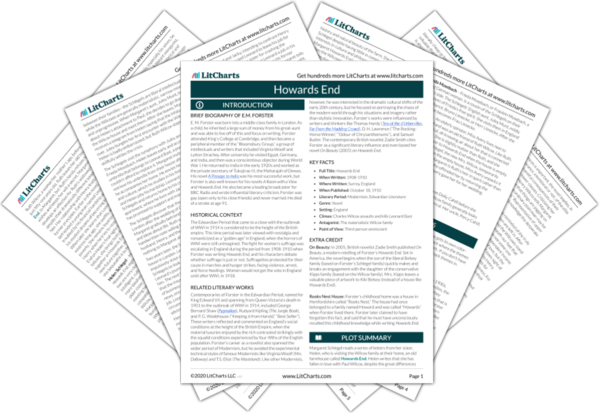Helen Schlegel Quotes in Howards End
“When I saw all the others so placid, and Paul mad with terror in case I said the wrong thing, I felt for a moment that the whole Wilcox family was a fraud, just a wall of newspapers and motor-cars and golf-clubs, and that if it fell I should find nothing behind it but panic and emptiness.”
“The truth is that there is a great outer life that you and I have never touched—a life in which telegrams and anger count. Personal relations, that we think supreme, are not supreme there. There love means marriage settlements, death, death duties. So far I’m clear. But here my difficulty. This outer life, though obviously horrid; often seems the real one—there’s grit in it. It does breed character. Do personal relations lead to sloppiness in the end?”
“Oh, Meg—, that’s what I felt, only not so clearly, when the Wilcoxes were so competent, and seemed to have their hands on all the ropes.”
…[Leonard’s] outburst ended in a swamp of books. No disrespect to these great names. The fault is ours, not theirs. They mean us to use them for sign-posts, and are not to blame if, in our weakness, we mistake the sign-post for the destination. And Leonard had reached the destination. He had visited the county of Surrey when darkness covered its amenities, and its cosy villas had re-entered ancient night. Every twelve hours this miracle happens, but he had troubled to go and see for himself. Within his cramped little mind dwelt something that was greater than Jefferies’ books—the spirit that led Jefferies to write them.
“You shall see the connection if it kills you, Henry! You have had a mistress—I forgave you. My sister has a lover—you drive her from the house. Do you see the connection? Stupid, hypocritical, cruel—oh, contemptible!—a man who insults his wife when she’s alive and cants with her memory when she’s dead. A man who ruins a woman for his pleasure, and casts her off to ruin other men. And gives bad financial advice, and then says he is not responsible. These men are you. You can’t recognise them, because you cannot connect… Only say to yourself, ‘What Helen has done, I’ve done.’”
Margaret was silent. Something shook her life in its inmost recesses, and she shivered.
“I didn’t do wrong, did I?” [Henry] asked, bending down.
“You didn’t, darling. Nothing has been done wrong.”
From the garden came laughter. “Here they are at last!” exclaimed Henry, disengaging himself with a smile. Helen rushed into the gloom, holding Tom by one hand and carrying her baby on the other. There were shouts of infectious joy.
“The field’s cut!” Helen cried excitedly—“the big meadow! We’ve seen to the very end, and it’ll be such a crop of hay as never!”

Helen Schlegel Quotes in Howards End
“When I saw all the others so placid, and Paul mad with terror in case I said the wrong thing, I felt for a moment that the whole Wilcox family was a fraud, just a wall of newspapers and motor-cars and golf-clubs, and that if it fell I should find nothing behind it but panic and emptiness.”
“The truth is that there is a great outer life that you and I have never touched—a life in which telegrams and anger count. Personal relations, that we think supreme, are not supreme there. There love means marriage settlements, death, death duties. So far I’m clear. But here my difficulty. This outer life, though obviously horrid; often seems the real one—there’s grit in it. It does breed character. Do personal relations lead to sloppiness in the end?”
“Oh, Meg—, that’s what I felt, only not so clearly, when the Wilcoxes were so competent, and seemed to have their hands on all the ropes.”
…[Leonard’s] outburst ended in a swamp of books. No disrespect to these great names. The fault is ours, not theirs. They mean us to use them for sign-posts, and are not to blame if, in our weakness, we mistake the sign-post for the destination. And Leonard had reached the destination. He had visited the county of Surrey when darkness covered its amenities, and its cosy villas had re-entered ancient night. Every twelve hours this miracle happens, but he had troubled to go and see for himself. Within his cramped little mind dwelt something that was greater than Jefferies’ books—the spirit that led Jefferies to write them.
“You shall see the connection if it kills you, Henry! You have had a mistress—I forgave you. My sister has a lover—you drive her from the house. Do you see the connection? Stupid, hypocritical, cruel—oh, contemptible!—a man who insults his wife when she’s alive and cants with her memory when she’s dead. A man who ruins a woman for his pleasure, and casts her off to ruin other men. And gives bad financial advice, and then says he is not responsible. These men are you. You can’t recognise them, because you cannot connect… Only say to yourself, ‘What Helen has done, I’ve done.’”
Margaret was silent. Something shook her life in its inmost recesses, and she shivered.
“I didn’t do wrong, did I?” [Henry] asked, bending down.
“You didn’t, darling. Nothing has been done wrong.”
From the garden came laughter. “Here they are at last!” exclaimed Henry, disengaging himself with a smile. Helen rushed into the gloom, holding Tom by one hand and carrying her baby on the other. There were shouts of infectious joy.
“The field’s cut!” Helen cried excitedly—“the big meadow! We’ve seen to the very end, and it’ll be such a crop of hay as never!”











